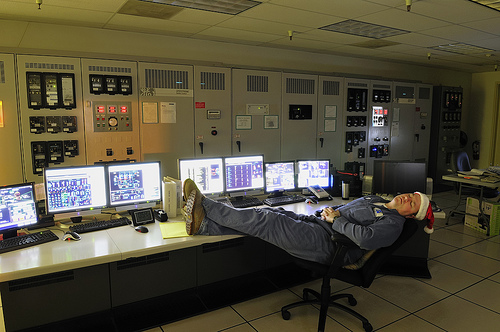A few days ago I wrote about the risks involved with shift work, which I realize wasn’t the most encouraging post for people in those positions. So, when I saw The National Sleep Foundations’ article on how to cope with such work I was excited to write a follow-up post with tips to use while on the job. They can’t solve any long term risks to your body, but will increase safety.
According to the NSF, a shift worker is anyone with a work schedule outside of the typical “9 to 5″ business day, usually someone who begins work after 6pm but before 6am. Below are some strategies to help avoid “microsleep”, “an involuntary bout of sleep brought on by sleep deprivation that lasts for a few seconds.”
- Avoid long commutes and extended hours. People who work as nurses, doctors, policemen and pilots, who often work 12 hour shifts, do get somewhat accustomed to working long hours, but the risk comes in when you go beyond the already difficult 12 hour shift. A long commute after such a shift can be dangerous. Consider carpooling, public transport or try moving closer to work.
- If possible, take short nap breaks throughout the shift. A 30 minute power nap is as beneficial as 4 hours of restorative sleep. The NSF article said “napping is essential and can be extremely effective at eliminating fatigue-related accidents. Some employers may not allow napping, but [this] might be a legal liability. Thus, efforts to make workplace policies nap-friendly may soon gain popularity as the issue increases in global significance.”
- Work with others to keep you alert. Engaging your mind helps your brain recognize you still need to be awake. Crack a joke! Laughter keeps your body active and alert.
- Be active during breaks.
- Keep hydrated. Dehydration just increases exhaustion, so make sure you drink plenty of water throughout your shift.
- Don’t leave tedious or boring tasks for the end of your shift when you are apt to feel drowsiest. Night shift workers are sleepiest around 4:00 – 5:00am.
- Exchange ideas with colleagues on ways to cope with problems. Create a support group to discuss these issues and learn from each other.



{ 2 comments… read them below or add one }
do you have any ideas for a shift workers off time help , i work thirds or midnights on a set schedule 3 12 hour shifts a week spread apart so I work one off two work 2 off 1 and so on, my off days in between I’m often groggy and can not get going or get anything done, I always feel tired and on my off days I’m often going back to sleep or taking naps and feel like I’m sleeping all my time off.
Hi there Shawn – Your circadian clock sounds like it’s off kilter. We can’t provide you with specific medical advice but if you’re sleeping a lot during your time off, you’re probably sleep deprived! Take a look at the advice in the blog post above for ideas on and off work – stay hydrated, get exercise, watch your intake of processed foods – and check in with your doctor to make sure everything else is AOK.